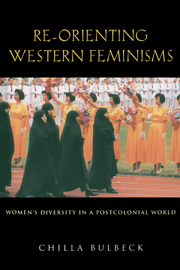Book contents
- Frontmatter
- Contents
- Acknowledgements
- Abbreviations
- Introduction
- 1 Fracturing Binarisms: First and Third Worlds
- 2 Individual versus Community
- 3 Mothers and Wives
- 4 Sexual Identities: Western Imperialism?
- 5 The International Traffic in Women
- Conclusion: Braiding at the Borderlands
- Endnotes
- Bibliography
- Index
4 - Sexual Identities: Western Imperialism?
Published online by Cambridge University Press: 29 January 2010
- Frontmatter
- Contents
- Acknowledgements
- Abbreviations
- Introduction
- 1 Fracturing Binarisms: First and Third Worlds
- 2 Individual versus Community
- 3 Mothers and Wives
- 4 Sexual Identities: Western Imperialism?
- 5 The International Traffic in Women
- Conclusion: Braiding at the Borderlands
- Endnotes
- Bibliography
- Index
Summary
The limitations of our current approaches to masculinity are summed up by the … startling ethnocentrism by which a discourse of ‘masculinity’ is constructed out of the lives of (at most) 5 percent of the world's population of men, in one culture-area, at one moment in history.
–Connell 1993:600As Third World women, our sexuality has been subject to public scrutiny and judgment. We are viewed as either oversexed or asexual, immoral or puritanical.
–Basu 1981:71When colonial conquest included ‘conquest’ of subordinated women, constructing them often as licentious or promiscuous, white middle-class women drew the distinction of their whiteness, which qualified their gender as being pure, in contrast to the licentious women of colour. More recently white women have ‘become’ sexually liberated. Against this modern woman is posed ‘atavistic’ traditions like overpopulation, religious fanaticism, clitoridectomy, polygamy, child marriage (Martin 1991:122; Mohanty 1991:5), some of which were discussed in Chapter 2. The sexually backward ex-colonised woman is revealed in the stereotype of the docile Hindu woman, the supremadre self-abnegating Latina, the circumcised and veiled Muslim woman.
In response to this minefield of sexual representation, some women of colour refute the importance of sexual self-expression for more basic issues like health or work: ‘who you go to bed with’ is a luxury to be indulged in by the ‘spoiled bourgeoisie of the rich west’ (Carmen et al. 1984:61). Women of Africa ‘tend not to emphasize the quest for sexual freedom and promiscuity’, a quest which preoccupies the Western feminist (Ogundipe-Leslie 1992:112–13).
- Type
- Chapter
- Information
- Re-orienting Western FeminismsWomen's Diversity in a Postcolonial World, pp. 129 - 166Publisher: Cambridge University PressPrint publication year: 1997



